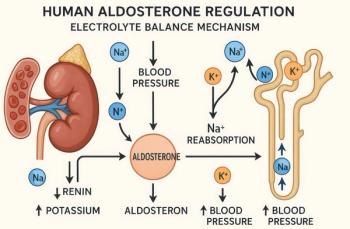
High Uric Acid Levels Signal Hypertension in Blacks
WINSTON-SALEM, N.C. -- High serum levels of uric acid are strongly associated with risk for hypertension, particularly among blacks, reported researchers here.
WINSTON-SALEM, N.C., Nov. 6 -- High serum levels of uric acid are strongly associated with risk for hypertension, particularly among blacks, according to researchers here.
They found the association in a biracial cohort of middle-age men and women who took part in the Atherosclerosis Risk in Communities study. Black men had about a 30% greater risk for hypertension if they had higher serum uric acid levels compared with white men, and black women had about a 15% greater risk than white women for hypertension and hyperuricemia.
"The novel angle of our study is that the association between uric acid and hypertension is much stronger in blacks, a group that disproportionately suffers from kidney disease, stroke and other complications of hypertension," reported Philip B. Mellen, M.D., of Wake-Forest here, and colleagues, in the online edition of Hypertension.
The findings suggest that a therapeutic strategy of lowering serum uric acid, now being explored in clinical trials, has the potential to reduce hypertension and the attendant risk of cardiovascular and cerebrovascular complications, said Dr. Mellen and colleagues.
Although African Americans have higher rates of hypertension and associated complications than whites, blacks have been under-represented in studies exploring whether the link between hyperuricemia and blood pressure, the authors noted.
In their study, 9,104 participants who were free of hypertension at baseline were evaluated for hypertension at three-year intervals over four examinations during the study.
The authors created adjusted Cox proportional hazards models to assess the risk of incident hypertension or progression of blood pressure category for each standard-deviation higher baseline serum uric acid.
The mean age of participants at baseline was 53.3 (range 45-64). The mean systolic blood pressure was 113.8 + 12.2 mm Hg, and the mean diastolic pressure was 70.2 + 8.6 mm Hg. The mean serum uric acid level was 5.7 + 1.4 mg/dL.
The investigators found that among the group as a whole, higher levels of uric acid were associated with greater risk for hypertension after adjustment for age, baseline blood pressure, body mass index, renal function, diabetes, and smoking. Each standard deviation higher was associated with a hazard ratio of 1.10 (95% confidence interval, 1.04-1.15).
In subgroup analyses, the hazard ratio for each higher standard deviation of serum uric acid in black men was 1.32 (95% CI, 1.14 to 1.54), and in black women was 1.16 (95% CI, 1.03 to 1.31). In contrast, there was virtually no association between serum uric acid in either white men (hazard ratio 1.01, 95% CI 0.94 to 1.09) or in white women (hazard ratio 1.04, 95% CI 0.96 to 1.11).
The authors saw a similar pattern when they modeled blood pressure progression, with an overall hazard ratio of 1.10 (95% CI, 1.05 to 1.14). For black men, the hazard ratio was 1.26 (95% CI, 1.11 to 1.42), and for black women it was 1.18 (95% CI, 1.06 to 1.31). In contrast, for white men the hazard ratio was 1.05 (0.99 to 1.11), and for white women it was 1.05 (1.00 to 1.12).
"The positive association between serum uric acid and incident hypertension was stronger in blacks and most pronounced among black men," the authors wrote. "This observation is significant considering the fact that blacks suffer disproportionately from hypertension and its associated target-organ damage. Hypertension control rates are lower among blacks, despite the fact that hypertension awareness and treatment is equal or higher in blacks compared with non-Hispanic whites."
The investigators acknowledged that although they adjusted their analyses for potential confounding factors, it's possible that the higher body mass indices, diabetes prevalence, and baseline blood pressure among blacks compared with whites could have also have been confounding factors.
Another limitation to the study pointed out by the authors was one imposed by the study exclusion criteria. "The exclusion of individuals who were hypertensive at baseline selected out individuals with hypertension onset at a younger age, and, thus, our findings may not be reflective of earlier-onset hypertension," they wrote.
"This is of particular concern given the fact that the majority of blacks (56%) in Atherosclerosis Risk in Communities were hypertensive at baseline, which could introduce selection bias," they added. "Similarly, the prevalence of baseline renal insufficiency, an exclusion criterion, was higher in blacks."
Newsletter
Enhance your clinical practice with the Patient Care newsletter, offering the latest evidence-based guidelines, diagnostic insights, and treatment strategies for primary care physicians.
































































































































